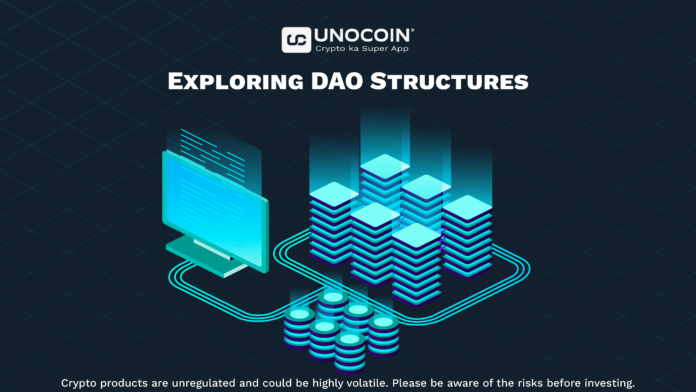Decentralized Autonomous Organizations (DAOs) represent a groundbreaking decentralized governance and decision-making concept. As blockchain technology continues to evolve, DAOs have emerged as innovative structures enabling distributed communities to govern themselves autonomously, without centralized authorities. In this blog, we will explore the fundamental concepts and structures of DAOs, highlighting their potential benefits and challenges.
What are DAOs?
DAOs are organizational structures that leverage blockchain technology and smart contracts to enable collective decision-making, resource allocation, and governance among their members. Unlike traditional organizations governed by centralized entities such as corporations or governments, DAOs operate based on predefined rules and protocols encoded in smart contracts, which execute automatically without human intervention.
Key Components of DAOs:
- Smart Contracts: Smart contracts are self-executing agreements programmed with predefined conditions and actions. In the context of DAOs, smart contracts facilitate the automation of governance processes, including voting, fund allocation, and proposal execution. By leveraging smart contracts, DAOs ensure transparency, immutability, and trustless operation.
- Tokenized Governance: DAOs often utilize cryptographic tokens to represent membership rights and voting power within the organization. Token holders participate in governance decisions by staking or voting with their tokens, proportional to their holdings. This tokenized governance model ensures that decision-making reflects the preferences of the community and aligns incentives among participants.
- Proposal and Voting Mechanisms: DAO members can submit proposals for various initiatives, such as funding projects, implementing protocol upgrades, or changing governance parameters. Proposals are typically subject to a voting process, where token holders cast votes to approve or reject them. DAOs may employ different voting mechanisms, including simple majority, quadratic voting, or liquid democracy, to ensure fairness and effectiveness.
- Decentralized Treasury: Many DAOs maintain a decentralized treasury funded by contributions from members or revenue generated by the organization’s activities. The treasury serves as a pool of funds that can be allocated to approved proposals, such as grants, bounties, or investments. Transparent and accountable management of the treasury is essential for maintaining trust and legitimacy within the DAO community.
Benefits of DAOs:
- Decentralization: DAOs empower distributed communities to govern themselves autonomously, without relying on centralized authorities or intermediaries. This decentralization fosters inclusivity, transparency, and resilience, as decision-making power is distributed among participants.
- Efficiency and Transparency: By leveraging blockchain technology and smart contracts, DAOs automate governance processes, reducing bureaucracy, and enhancing efficiency. Transparent on-chain governance ensures that decisions are recorded immutably and can be audited by anyone, fostering trust and accountability.
- Incentive Alignment: Tokenized governance aligns the interests of Decentralized Autonomous Organizations members with the success and sustainability of the organization. Token holders have a direct stake in the outcomes of governance decisions, incentivizing them to act in the best interests of the community and contribute to its growth and prosperity.
- Innovation and Flexibility: DAOs provide a flexible and adaptable framework for experimenting with new governance models, incentive mechanisms, and economic structures. This flexibility enables DAOs to evolve and innovate over time, responding to changing market conditions and community preferences.
Challenges and Considerations:
- Regulatory Uncertainty: The regulatory landscape surrounding DAOs is still evolving, with legal frameworks varying significantly across jurisdictions. Regulatory compliance and legal liability are important considerations for DAOs seeking to operate within the bounds of the law and mitigate regulatory risks.
- Governance Coordination: Achieving consensus and coordination among diverse stakeholders within a DAO can be challenging, particularly in large and decentralized communities. Effective governance mechanisms and decision-making processes are essential for ensuring that proposals are evaluated fairly and implemented efficiently.
- Security Risks: DAOs are susceptible to security vulnerabilities, including smart contract bugs, governance attacks, and malicious behavior by bad actors. Robust security measures, code audits, and community vigilance are necessary to mitigate these risks and safeguard DAO assets and operations.
Conclusion:
Decentralized Autonomous Organizations represent a groundbreaking paradigm shift in organizational governance and decision-making. By leveraging blockchain technology, smart contracts, and tokenized governance, DAOs empower distributed communities to govern themselves autonomously, fostering inclusivity, transparency, and efficiency. While DAOs face challenges such as regulatory uncertainty, governance coordination, and security risks, their potential to revolutionize traditional organizational structures and catalyze innovation is undeniable. As the ecosystem continues to evolve, exploring different structures, governance models, and best practices will be essential for unlocking their full potential in the decentralized future.
Please find the list of authentic Unocoin accounts for all your queries below:
- Twitter: https://twitter.com/Unocoin
- Instagram: https://www.instagram.com/unocoin/
- Facebook: https://www.facebook.com/unocoin/
- LinkedIn: https://in.linkedin.com/company/unocoin
- YouTube Channel: https://www.youtube.com/c/Unocoin/videos
- Newsletter: https://medium.com/subscribe/@Unocoin_growth
- Blogs: https://blog.unocoin.com
- Telegram Group: https://t.me/Unocoin_Group
- Telegram Channel: https://t.me/+fasQhTKBsfA5N2Zl
- Telegram: https://t.me/UnocoinSupport_Bot
- E-mail id: [email protected]
- Contact details: 7788978910 (09:30 AM IST – 06:30 PM, Mon-Sat)
- App store link: https://apps.apple.com/us/app/unocoin/id1030422972?ls=1
- Playstore link: https://play.google.com/store/apps/details?id=com.unocoin.unocoinwallet
Disclaimer: Crypto products are unregulated as of this date in India. They could be highly volatile. At Unocoin, we understand that there is a need to protect consumer interests as this form of trading and investment has risks that consumers may not be aware of. To ensure that consumers who deal in crypto products are not misled, they are advised to DYOR (Do Your Own Research).




![Fundamental Analysis in Crypto [Updated Guide] A Comprehensive Guide to Asset Valuation.png](https://blog.unocoin.com/wp-content/uploads/2024/11/A-Comprehensive-Guide-to-Asset-Valuation-218x150.png)